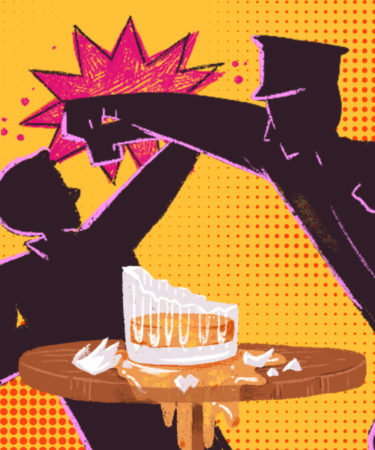New York City is awash with entrepreneurs hoping to to play a part in the city’s expanding craft distillery movement. But in the late 19th century, Brooklyn’s Fifth Ward (or today’s Vinegar Hill), was the scene of a series of hostile and sometimes violent raids by the federal government targeting local moonshiners. Collectively referred to as the “Whiskey Wars,” this series of conflicts left the neighborhood and its residents in a state of spirit-fueled chaos.
Following President Lincoln’s Revenue Act of 1862, which included a tax on beer and fermented liquors, many of the country’s distilleries were forced to close. Others, of course, continued their operations illegally. But the roots of the raids date even further back, to the time of George Washington’s presidency.
The fallout from the Whiskey Rebellion, when farmers in western Pennsylvania protested and eventually took up arms against the newly formed government’s 1791 Excise Whiskey Tax, “made it impossible for any politician to touch this notion of taxing alcohol until the memory of that episode had faded or there was some broader crisis,” Colin Spoelman, co-founder of Brooklyn’s Kings County Distillery, tells VinePair.
Americans living in the frontier territories viewed whiskey as a barterable commodity akin to currency. Any federal tax was considered to be a direct infringement on their economic livelihood. Despite being politically infeasible in peacetime, the tax would reappear to help fund America’s wars, first in 1812 and again during the Civil War in the 1860s.
During the 1800s, the Fifth Ward came to be known as “Irishtown” due to a large influx of Irish immigrants in the neighborhood. It was also flush with distilleries: Many of the migrants traveled to the States to escape Ireland’s excise taxes, and brought with them their own tricks for staying a step ahead of the government.
As a 2014 article in Smithsonian Magazine notes, “Irishtown’s alleys smoked with distillery fumes and stills were hidden in cellars or abandoned shanties, built to be dissembled quickly.”
When the federal government reinstituted the tax in 1862, Fifth Ward distillers felt no obligation to pay their dues. It wasn’t until after the Civil War that the government came after them, employing soldiers based at the Brooklyn Navy Yard to crack down on illicit distillers. With Irishtown and the Navy Yard adjacent to each another, conflict became rampant. (Kings County Distillery is, somewhat ironically, headquartered in the former Navy Yard.)
The first raid began with a fist fight in an alleyway in October 1869. After the tussle, 100 army veterans confiscated nine stills from Irishtown distillers. The distillers fought back with a maelstrom of bricks and stones to drive the soldiers away.
But the conflicts continued intermittently for several years, with each “battle” requiring greater numbers of soldiers. During a raid in December 1869, 13 more stills were confiscated and their contents were, devastatingly, poured into the streets.
After a revenue official was shot and killed in 1871, public outrage grew strong enough to spur a final, more aggressive government comeback, eventually putting an end to Irishtown’s distilling days — although it certainly didn’t snuff the distillers’ spirit from the borough forever.
This story is a part of VP Pro, our free platform and newsletter for drinks industry professionals, covering wine, beer, liquor, and beyond. Sign up for VP Pro now!
